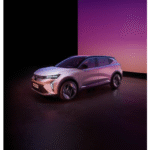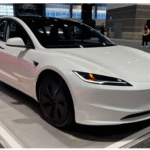Electric cars are trendy. Quiet. Supposedly cheaper. Greener, too. But are they really worth it in the long run? That’s the big question folks ask before making the switch. Let’s dig into the real lifespan of electric cars—and how they compare to old-school gas vehicles.
Electric Vehicle Battery Lifespan: How Long Can It Hold Up?
You’ve heard it before: the battery is everything in an electric vehicle. Without it? Dead weight on wheels.
- Most electric vehicle batteries last somewhere between 8 to 20 years. Depends on how you drive, where you live, and how often you charge it.
- Battery degradation isn’t dramatic overnight. It’s a slow drip—about 2% loss per year. So in 5 years, you might still get 90% rang
- Fast charging? Handy, but not friendly to your battery. It heats things up fast, and that heat speeds up the battery’s wear and tear. Do it too often, and you’ll feel it in the range.
Bottom line: Electric vehicle batteries hold up decently—but don’t expect miracles. Push them hard or charge fast too often, and you’ll see the limits fast.
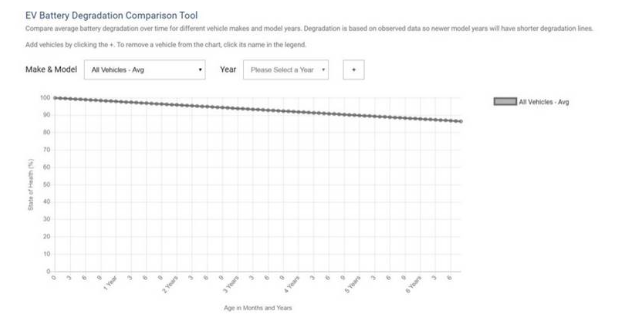
ELECTRIC VEHICLE BATTERY DEGRADATION STUDY RESULTS
Source: https://www.chargedfuture.com/electric-car-battery-degradation/
Electric Cars vs Gas Cars: What Lasts Longer?
Here’s the meat of it. Electric vehicles and gas cars age differently. Take a look:
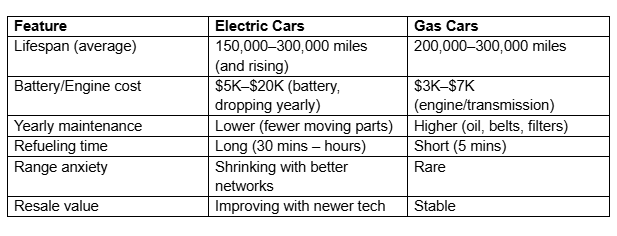
So sure—electric vehicles have fewer moving parts, which means fewer repairs. And while battery replacement is a big-ticket item, prices are dropping fast as tech improves. Many electric vehicle makers also offer warranties covering 8 years or 100,000+ miles.
With government incentives, ultra-low maintenance, and growing charging infrastructure, the scales are tilting in favor of electric vehicles—especially for city and commuter use.
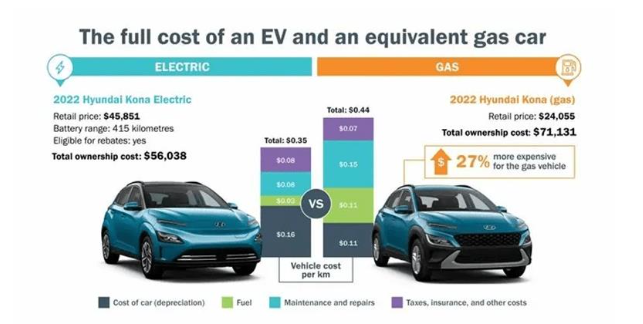
Source: https://nhsjs.com/2024/to-what-extent-is-the-present-value-of-user-and-external-costs-influenced-by-the-car-type-gas-hybrid-or-electric/
Real People, Real Stories: Living with an Electric Vehicle
Middle-Class Drivers
Middle-income families often buy electric vehicles to cut down on gas and maintenance costs—and many say it’s paying off.

INERACTIVE MAP OF CHARGING STATIONS ACROSS AMERICA
Source: https://geocadder.bg/2023/08/07/interactive-maps-for-the-ev-charging-stations/
- Charging stations are growing fast, especially in cities and suburbs.
- Range anxiety fades as you get used to the car’s habits.
- Home charging turns into a convenience—no more trips to the pump.
“We’ve saved a lot on fuel and upkeep,” one driver said. “Charging overnight means I always leave with a full tank—can’t do that with gas.”
Upper-Class EV Owners
Higher-income households often treat electric vehicles as their primary car in the city.
- They love the instant torque and smooth acceleration.
- The ride is silent and luxurious.
- And now with better battery tech, confidence in long-term value is growing.
“I drive a gas car on weekends. But during the week? My electric vehicle’s just smarter and cleaner,” said one tech exec.
Older Generation’s Take
Surprisingly, many older drivers are making the switch and loving the ease.
- No oil changes, no engine troubles.
- The quiet ride? Easier on the ears.
- Many models now have simplified controls and voice features.
“I thought it would be too techy,” one senior said. “But honestly, I just plug it in and go. No drama.”
Electric Vehicle Interiors vs Gas Cars: Sleek, Smart, and Ahead in Comfort
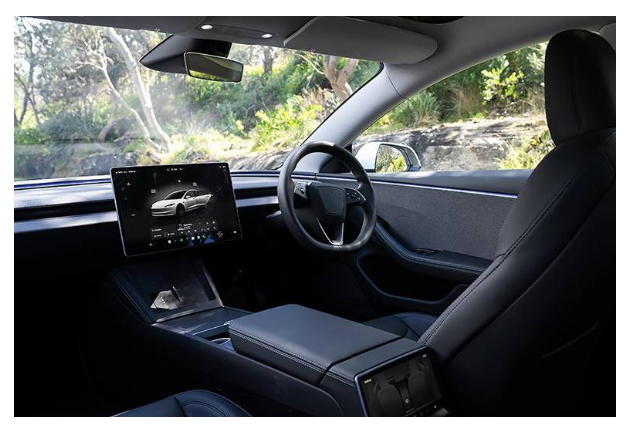
INTERIOR OR TESLA MODEL 3
Source: https://www.carsales.com.au/editorial/details/tesla-model-3-rear-wheel-drive-v-toyota-camry-ascent-2024-comparison-147866/s
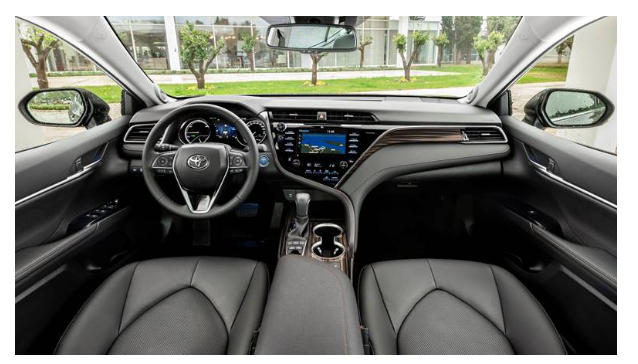
INTERIOR OF TOYOTA CAMRY
Source: https://www.topgear.com/car-reviews/toyota/camry/interior
Electric vehicles bring a fresh, modern vibe inside. Big, sharp screens. Clean, minimalist dashboards. Controls designed for the future.
Gas cars stick to the old-school style—dials, knobs, and simple layouts.
But here’s the thing:
- EV interiors feel high-tech and intuitive, designed to make driving easier and more connected.
- Many drivers love how electric vehicles put info and controls right where you need them—no fumbling, no clutter.
- The minimalist design isn’t just for looks—it reduces distractions and keeps focus on the road.
- Meanwhile, gas car interiors can feel outdated, bulky, and less suited for modern tech integration.
For comfort, convenience, and style, electric vehicle cabins often lead the pack, especially for those who want the latest gadgets without the fuss.
How Charging Affects Lifespan
Let’s get technical—but not too much.
- Trickle charging (slow charging at home) is the best for your electric vehicle battery.
- Fast charging speeds things up but wears the battery out faster. Use it only when you really need to.
- Deep discharges mean letting your battery run all the way down to zero. That stresses the battery and shortens its life.
Pro tip? Keep your battery charged between 20% and 80% most of the time. Your battery will last longer that way.
Battery Replacement: The Cost You Should Know — But It’s Getting Better
Battery replacement is a big topic when it comes to electric vehicles.
- Sure, battery replacements can cost between $5,000 and $20,000 today—but prices are dropping fast as technology improves.
- Unlike gas engines, EV batteries rarely need repairs; when they do, a replacement usually means a fresh, reliable pack.
- Many manufacturers offer extended warranties covering 8 years or 100,000+ miles, giving peace of mind for most drivers.
- Plus, with advancing battery recycling and second-life uses, the overall cost and environmental impact are steadily improving.
So, while battery replacement can feel like a hit, the reality is shifting—making electric vehicle ownership more affordable and sustainable over time.
The Resale Puzzle: Will My Electric Vehicle Hold Value?
Electric vehicle resale values are improving every year.
- Older electric vehicles with smaller batteries did lose value quickly, but that’s changing fast.
- Newer electric vehicles with longer ranges and better tech hold their value much better, especially as demand for clean cars grows.
- Plus, government incentives and rising fuel costs make electric vehicles more attractive to used buyers.
- While gas cars have predictable resale, their values are starting to drop as more people look to switch to electric.
The resale market for electric vehicles is maturing—making them a smarter investment than ever before.
Final Word: Are Electric Cars a Smart Long-Term Investment?
If you:
- Commute daily, whether short or medium distances,
- Have easy access to home or workplace charging,
- And value lower maintenance and fuel costs,
Then an electric vehicle is definitely a smart long-term investment.
Even with battery replacement costs factored in, electric vehicles save money on repairs, fuel, and taxes over time. Plus, electric cars are only getting better—longer ranges, faster charging, and stronger resale values.
For drivers looking to reduce their carbon footprint and enjoy cutting-edge technology, electric vehicles offer real benefits that gas cars can’t match.
If you:
- Frequently take very long trips with limited charging stops,
- Need quick refueling anywhere, anytime,
- Or plan to keep a car for decades without much tech change,
Then a gas-powered vehicle might still be your best bet.
But for most people, electric cars are not just the future—they’re a smart ride today.
Verdict?
Electric cars are more than just exciting—they’re changing the way we drive. They last longer than many expect, with fewer headaches and lower running costs. Sure, they’re not perfect for everyone yet, but for most drivers, electric vehicles offer smarter, cleaner, and more cost-effective transportation.
The future is electric—and it’s already here. Do your homework, and you might find that an electric vehicle is the best choice for you.



